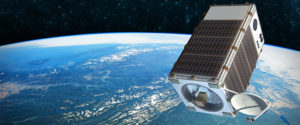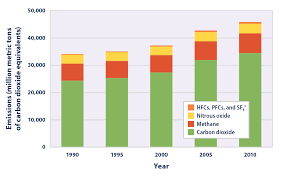
Image: EDF
One of the major problems facing environmental government and non-government groups is monitoring emissions from locations all over the planet. Many locations maybe quite remote while others are easily identifiable using land based monitoring systems. So, having a satellite to monitor emissions world wide is a way to accurately monitor emissions.
Methane emissions are a major component of climate change gases.Here are EPA projections for all climate change gases:

Chart: EPA – 2016
Environment Defense Fund President, Fred Krugg recently announced in a TedTalk, in Vancover, British Columbia that EDF was developing a fourth wave environmental monitoring system. The first wave was the conservation movement led by President Teddy Roosevelt, second came the anti-pollution laws of the 1960s and 1970s. Third, was the use of market based solutions and corporate partnerships in the 1990s.
The MethaneSAT is a Fourth Wave environmental monitoring system, using satellite technology to identify methane sources planet wide. Readings would be sent to government and non-government groups to identify sources, work out solutions and weigh alternative measures. Methane is a potent gas responsible for 25 % of all global warming. Targeting methane gas emissions is the fastest, cheapest way to attack global warming while other programs continue to focus on carbon dioxide emissions as well, according to EDF.
The launch target for MethaneSAT is 2021, with a focus on specific monitoring areas including 80 % of all oil and gas fields across the planet. Feedlots, agriculture and other methane sources will be monitored as well. EDF has set a high goal of 45 % reduction in oil and gas methane emissions by 2025. Achievement of this goal would deliver the same 20 year climate benefit as closing one third of all coal fired power plants worldwide.
We are pleased to see EDF take a proactive approach to monitoring methane worldwide, we hope that the U.S. and other countries will work hard to support this effort. The U.S. should not be waiting for an NGO to take the lead, the EPA needs to take the lead and focus on how to gather accurate data to effectively manage climate change initiatives as well as water.
